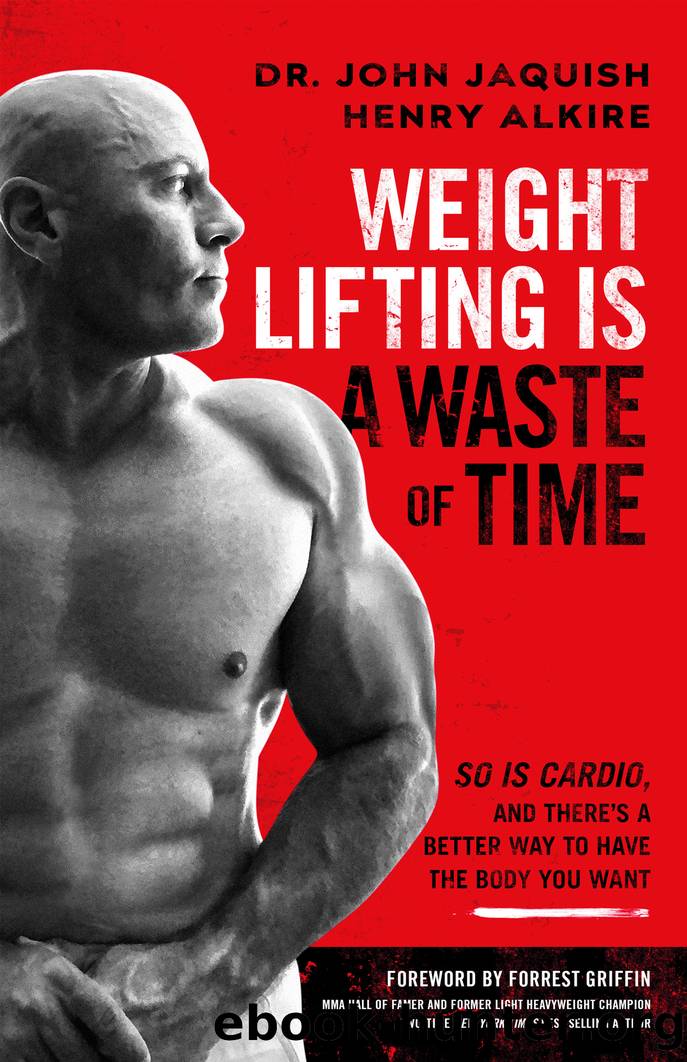Weight Lifting Is a Waste of Time by John Jaquish

Author:John Jaquish
Language: eng
Format: epub
Publisher: BookBaby
Published: 2020-07-17T19:57:37+00:00
Fasting Triggers an Anabolic Acceleration When It Ends
An intriguing 2016 study compared alternate day fasting with daily calorie restriction among obese subjects who were not engaged in exercise. The subjects engaged in eight weeks of intervention, followed by twenty-four weeks of unmodified follow-up. Measurements were made at the eight-week and thirty-two-week mark. At eight weeks, the fasting group had lost more weight as a percentage of starting weight (marginal significance, p=.056) with otherwise negligible differences between groups. However at the thirty-two-week follow-up, the fasting group had accomplished a statistically significant gain in percent lean muscle mass compared to baseline while the caloric restriction group had not. Also, at thirty-two weeks the fasting group retained a statistically significant decrease in percent body fat, while the caloric restriction group had no such improvement compared to baseline when measured at thirty-two weeks.118
We believe that because of the hormonal impacts of fasting, there may have been some lingering effect leading to its superiority over a longer time span. Effectively, it may have “primed” the body to build muscle and not to store fat so when participants presumably abandoned the diet after the eight-week mark, more of their increased caloric intake was diverted to lean mass growth resulting in the improvement seen at the thirty-two-week mark. Meanwhile, those in the caloric restriction group had no such hormonal benefit and promptly regained the fat that had been lost during the first eight weeks of the study when they were restricted in caloric intake.
It’s also interesting to note that in this study, the fasting group lost lean mass during the eight weeks of fasting, but the gains from weeks eight through thirty-two were so significant they overcame the initial loss to produce a statistically significant increase over the baseline values. If you are concerned about the initial loss of lean mass, keep in mind that fasting is not magic and a diet that is too low in calories or protein (and protein especially is easy to under consume) for a prolonged period of time will not be saved by fasting. But as we saw in this study, once caloric intake increased, the fasting participants were prepared for substantial muscle growth. This is doubly interesting because there is no evidence that any of the participants engaged in exercise of any kind, yet they still grew.
All of this begs a question: is there an anabolic acceleration mechanism at the end of a fast other than in this study that is not fully documented yet? We have seen in ourselves that after ending a longer fasted period there seems to be an anabolic acceleration effect lasting a few days where the added muscle mass seems far beyond what one would expect in that amount of time.
When it comes to fasting studies, the one kind of seemingly conflicting research you should look out for involves an unintentionally misleading definition of “fasting.” For example, one such study compared a group restricting calories with another group described as a “fasted” group. The problem
Download
This site does not store any files on its server. We only index and link to content provided by other sites. Please contact the content providers to delete copyright contents if any and email us, we'll remove relevant links or contents immediately.
What's Done in Darkness by Kayla Perrin(25490)
Shot Through the Heart: DI Grace Fisher 2 by Isabelle Grey(18208)
Shot Through the Heart by Mercy Celeste(18151)
The Fifty Shades Trilogy & Grey by E L James(17767)
The 3rd Cycle of the Betrayed Series Collection: Extremely Controversial Historical Thrillers (Betrayed Series Boxed set) by McCray Carolyn(13179)
The Subtle Art of Not Giving a F*ck by Mark Manson(12895)
Scorched Earth by Nick Kyme(11821)
Stepbrother Stories 2 - 21 Taboo Story Collection (Brother Sister Stepbrother Stepsister Taboo Pseudo Incest Family Virgin Creampie Pregnant Forced Pregnancy Breeding) by Roxi Harding(11009)
Drei Generationen auf dem Jakobsweg by Stein Pia(10207)
Suna by Ziefle Pia(10176)
Scythe by Neal Shusterman(9249)
International Relations from the Global South; Worlds of Difference; First Edition by Arlene B. Tickner & Karen Smith(8599)
Successful Proposal Strategies for Small Businesses: Using Knowledge Management ot Win Govenment, Private Sector, and International Contracts 3rd Edition by Robert Frey(8404)
This is Going to Hurt by Adam Kay(7680)
Dirty Filthy Fix: A Fixed Trilogy Novella by Laurelin Paige(6444)
He Loves Me...KNOT by RC Boldt(5795)
How to Make Love to a Negro Without Getting Tired by Dany LaFerrière(5366)
Interdimensional Brothel by F4U(5298)
Thankful For Her by Alexa Riley(5148)
